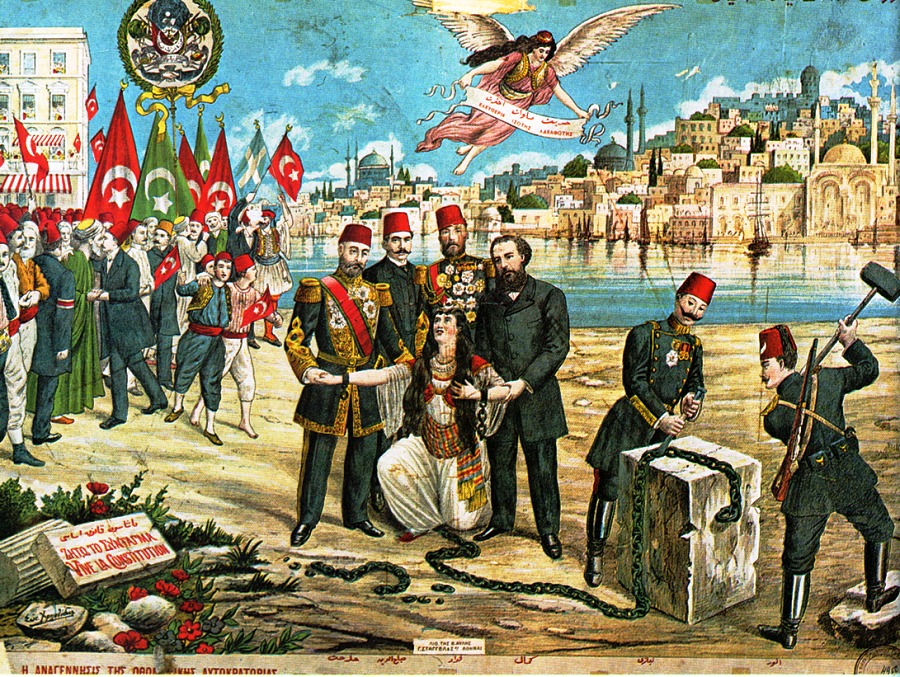Three points are especially interesting in connection with the remarkable change which has taken place in the condition of the Ottoman Empire.
Continuing The Turkish Revolution of 1908,
Today we begin the second part of the series with our selection from Ministerial Address by A. Rustem Bey. The selection is presented in 2 easy 5-minute installments. For works benefiting from the latest research see the “More information” section at the bottom of these pages.
A. Rustem Bey (1862-1934) was a diplomat for the Ottoman Empire.
Previously in The Turkish Revolution of 1908.
Time: 1908
Place: Istanbul

Public domain image from Wikipedia.
Three points are especially interesting in connection with the remarkable change which has taken place in the condition of the Ottoman Empire. First, the unprecedented manner in which one of the most despotically governed countries in the world has acquired freedom; secondly, the prospects of a satisfactory working of the new order of things and its permanence – in other words, the prospects of real reformation which the transformation offers; thirdly, the feelings with which the modified situation in which Turkey finds herself is viewed by her immediate neighbors and by the rest of the world.
The reestablishment by Abdul Hamid of the Constitution he had promulgated in 1876, and almost immediately afterward suspended, came as a tremendous surprise to everybody, not excepting the chiefs of the Young Turkey party, who did not expect such a sudden fruition of their patriotic labors. Undoubtedly these labors have been very great during the last ten years or so and marked by an ability and perseverance which reflect the greatest credit on the reorganizer of the party, Prince Sabah-ed-din, own nephew of Abdul Hamid, who, at the early age of thirty, has gained undying glory as the prime agent in the destruction of one of the most infamous and yet most deeply rooted political systems in the world. But the obstacles to success opposed by the ill – inspired genius of Abdul Hamid, and the extraordinary difficulty of weaning the Turkish peasant, who forms the backbone of the Turkish Army, from his almost animal devotion to the Sultan-Caliph, were recognized to be of such magnitude by the party as to cause it to believe that at least two or three years more would be necessary to bring about that general revolt of the troops upon which it had rightly centered its efforts and which, by depriving the Hamidian régime of its principal support, would bring it to the ground. What hastened the event is that the indescribably wretched condition which has been the lot of the Turkish soldier under the autocracy of the government, and which none but men of his admirably patient and disciplined race would have endured so long, became at last intolerable to him when he was brought into contact with his fellow sub jects, most of them his coreligionists, of the Macedonian Gendarmerie, whose treatment, under European supervision, formed such a contrast to his own. The army concentrated in Macedonia, which represented four-fifths of the military establishment of Turkey, having revolted, the movement spread with lightning rapidity to the neighboring troops in the Vilayet of Adrianople, and from them to those in the vicinity of Constantinople, because it arose from a reaction against unbearable sufferings common to all the soldiers of the Sultan, with the exception of those belonging to the pampered Guard, garrisoned around Yildiz itself, and also because, unlike former mutinies, the rebellion in Macedonia broke out in the midst of a whole Army Corps simultaneously, and thus gave encouragement to other units and divisions to follow suit.
The Young Turkey party had no anticipation of this happy precipitation of events, due to unforeseen causes ; but no sooner had the tendency manifested itself among the rank and file to take into its own hands the matter of the reformation of their lot -— their object was purely selfish in the beginning, and confined to the desire of remedying military grievances only than the party intervened through the numerous officers affiliated to its cause, and, adjusting the movement to its general purposes, gave it the significance of a political rising, which led, in an extraordinarily short time, to the attainment of its fundamental program. Herein lies the great merit of Prince Sabah-ed-din and his coadjutors. They were prepared for emergencies because they had patiently established a widespread connection with the regimental officers of the Turkish Army, the great majority of whom had personal as well as patriotic motives for adhering to the Young Turkey creed, but who ran the greatest risks in joining the ranks of the transformed into a revolution; the first, be it noted, which has taken place in the history of Turkey. It is a fact that, so far, all dethronements and other forced political changes in the Otto man Empire have been the result of conspiracies or revolts. It is a sign of the times that, whereas it has been impossible in the past to bring the Turkish masses into line against the throne, because to them it represented an intangible idol, semi-religious, semi-political, they have been awakened by their sufferings into a notion of solidarity, the underlying element of which is a new-born spirit of criticism in regard to the Sultan-Caliph. The great difference between the Turkish upheaval of 1876 and the present one is that the former represented the ideas of a small group of enlightened patriots, whereas the latter is thoroughly national in character.
| <—Previous | Master List | Next—> |
Edwin Pears begins here. Arminius Vambery begins here.
More information here and here, and below.
Leave a Reply
You must be logged in to post a comment.